Homilies by Revd George Kingsnorth (Deacon)
Shortly after being ordained as a Permanent Deacon, a fellow Deacon and Creative encouraged me to turn my homilies into videos and to publish them every week. Now another friend has suggested I turn the current 75 x approx 5 minute videos in a series of post casts. So here they are. I hope you find them useful.
Episodes
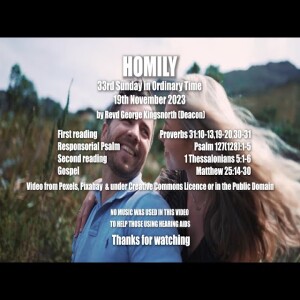
Thursday Nov 16, 2023
Homily - 33rd Sunday in Ordinary Time - 19th November 2023
Thursday Nov 16, 2023
Thursday Nov 16, 2023
Homily33rd Sunday in Ordinary Time19th November 2023In last Sunday’s reading, we were introduced to Wisdom as a woman, who has understanding and will keep you out of trouble, if you follow the right path. Through the description, we can visualise a person. Someone you would want to be with, especially as she wants to be with you.The reading from Proverbs, asks a question. The perfect wife, where can she be found? We are presented with someone who wants to be at our side. She boosts her husband’s confidence. She helps build his wealth. She will not harm him. She works hard providing for her family home and their needs. She always rolls her sleeves up to muck in. She provides for the poor and looks after the needy. We are told a charmer is deceitful, and beauty is empty. A woman with wisdom is the one to praise. Her work bears fruit and she deserves to be paid for her labour.This woman is not a slave. She is not a second-class citizen. She has rights and should be respected. She needs to be listened to, and when she questions her husband, he needs to take heed of what she says, because she is highlighting a blind spot in his thinking. Without her counsel, he could end up taking the wrong path. He may not like what she says, but this is his pride blinding him. He needs to step back and critically analyse what he is saying and how this may impact the family home. If he chooses to do what he thinks is best, what evidence is there he has made the right decision? Is this what God wants? If it is not, then we are heading towards disaster.In Genesis Chapter 2, God shaped Man from dust and breathed his spirit into his nostrils. Man became a living being. In this version of the creation story, God allowed Man to name all the creatures God created, but Man was not happy. He was lonely. He needed a helper. God did not shape the Woman out of fresh dust but instead took her from Man. In other words, both male and female were created at the same time as a single being, then separated so they could be two. These humans, one male and the other female, could help each other. They could be companions to one another. Each is different, complimenting each other, seeing things differently but allowing them equally to critically assess things, from their own unique perspective. Genesis 2 verse 24 states: “This is why a man leaves his father and mother and becomes attached to his wife, and the two become one flesh.” This is stated before the Fall in Chapter 3. What is not stated but implied is that a woman also leaves her mother and father to become attached to her husband.The Psalm tells us that we are blessed if we fear the Lord and walk in his ways. Some say our interpretation of fear is incorrect. In Hebrew, there are two words for fear. One is Pachad, meaning fear of imaginary things stirring up irrational worries. The other word is Yirah, meaning being overawed by our surroundings or having deep respect, reverence and devotion for someone we admire. So, we should not be fearful, but be in Awe of the Lord and blessed when we walk in his ways. Through work, we should prosper, and our homes should be places where our children thrive. Our world isn’t ideal. Both parents often need to work. They can struggle to make ends meet, even on good salaries. We constantly seem to live in a world going through labour pains every day. Most are worn out by the pressure. We no longer have time to think due to exhaustion and are made to feel guilty if we take a break. We all miss the quiet and peacefulness. Fear, as in the automatic negative thoughts that often invade our minds, keep us lost in the future trying to prevent disasters, or stuck in the past, fretting over things we cannot forgive ourselves for. As we reflect on Matthew's Gospel, we need to consider what talents God has given us that are precious. Our real riches are the spouses we have been connected to, who make us feel complete but who respect us enough to allow us to be ourselves. We should not bury our husband or wife in the produce of our selfishness as this can only lead to ruin. Our job is to nurture our spouses so they can be fulfilled and attain their full potential. Not through what they do but in who they are as a person. We all need meaning in our lives. Our investment in them will enable God to say to us, “Well done, good and faithful servant.”
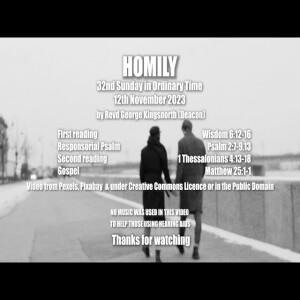
Friday Nov 10, 2023
Homily - 32nd Sunday in Ordinary Time - 12th November 2023
Friday Nov 10, 2023
Friday Nov 10, 2023
Homily32nd Sunday in Ordinary Time12th November 2023Whenever we go on a journey, the first thing most of us do, even when using Google Maps, is to work out where our destination is going to be. As a youngster, I always pulled out a paper map, found my destination and then tried to work out which was the quickest way to get there. I could not just sit on my motorcycle and head off without having a sense of direction to go in. Having the knowledge of the destination is the first thing. On Google Maps, you can type in the address and hit enter. It will then take you to your desired location. By tapping the Directions button a route will be plotted, but most importantly you’ll get the information about how many miles or kilometres the journey will be and how long it should take to get there. You may find you have alternative routes to select, whether scenic or the quickest route. From home to Knock in County Mayo, let’s say, is 128 miles. One route takes me through Longford and the other through Cavan and Carrick-On-Shannon. Both will take roughly 3 hours and 22 minutes. On long journeys, my car should do 45 mpg in city traffic and possibly 88 mpg on motorways. That’s if you believe the blurb that comes with the car. My expectation is around 64 miles per gallon, or 103 kilometres based on experience. So about two gallons or just over seven and a half litres. My car takes 50 litres so I tend to fill it up, knowing I should be able to do a round trip and travel a bit sightseeing while I’m there. Nearly three and a half hours is a long drive. At my age, I know I’ll need at least two comfort stops to stretch my legs. If I take a tea then I could be stopping for about fifteen minutes each stop, so probably best to round the time up to four hours. I’ll also need to eat something, more fuel for me.Before the journey, I need to make sure the tyres are pumped up, all my light bulbs are working, and I have plenty of oil in the car and water for the windscreen wipers. There is a lot to plan for, and even then, something unexpected may occur which could delay my journey further. Possible roadblocks such as a flood, an accident, sheep or cows being moved from one field to another, lots of tractors slowing down traffic, and even cyclists. You never know.There is wisdom in planning every trip so that you do not come up short, especially if you run out of fuel. In today’s Gospel, the story Jesus tells is of five wise bridesmaids preparing for the long haul and five foolish ones who simply did not think things through. The groom was delayed, and all fell asleep. The lamps used up the initial oil, but the wise bridesmaids brought an extra stock for emergency purposes. They also knew not to give the foolish girls any of their spares in case they also ran out, and their light would be gone. By not planning the fools had to run off into the dark to find some more oil. What is also telling is they did not consider at that time of night no shops would be open either. They still ran off without any wit. They hadn’t the brains to think it through. But the wise girls knew what possibilities could occur and prepared for all events. They knew there was a possibility the groom could be late as unexpected things happened.In the book of Wisdom, we are presented with a wise girl who is bright, intelligent and not dim or stupid. She knows who is looking for her, and even to think about her, our understanding grows. Wisdom will show you the way and guide you away from trouble. If we look for her, our anxieties will quickly be dispersed. If we do what is right, she will always be with us. Wisdom wants to be our companion. To do what is right is to search for God in our everyday world. The more we think about him, the more we will be able to find him. This also is wisdom.St Paul reminds us in his first letter to the Thessalonians, that each of us is here for such as short time. Some go before others, but we are not to mourn their loss for they will also rise and, in fact, will be the first to do so, if we find ourselves still alive in this world at Christ Jesus’ Second Coming. If we can seek the Lord and witness his presence about us, we should be comforted that all who follow Christ will be risen on the last day.In our world of distractions that attempt to lead us away from God, we are not to be foolish in thinking he is not there. Wisdom says if we seek, we will find. God will be only too happy to be revealed in our lives. He is always there even if we do not recognise him being so. What is important is that with wisdom we may plan the journey ahead. She will show us the way and there will be no trouble, but if we fail to prepare, we must be prepared to fail.Amen.
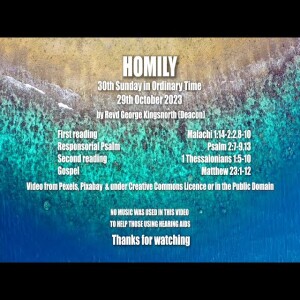
Saturday Nov 04, 2023
Homily - 31st Sunday in Ordinary Time - Sunday 5 November 2023
Saturday Nov 04, 2023
Saturday Nov 04, 2023
Homily31st Sunday in Ordinary TimeSunday 5 November 2023In “Every Day with Jesus”, I am reading the second book of Chronicles. The genealogy is tough to get through, but the stories of the kings highlight the criticism highlighted in today’s readings from Malachi, Paul’s first letter to the Thessalonians and the words of Jesus in Matthew’s Gospel.The Israelites wanted to be ruled by kings, just like the people who lived around them. They forgot that the Lord of Hosts was their King, he supplied them with all their needs, but the Israelites had been influenced by those who would draw them away from God. This always led to disaster.Saul’s fears always got the better of him, he performed a burnt offering without Samuel, taking it upon himself to do the duties of a Levite because of his impatience. Saul lost his favour with God, and David eventually became king. As David’s sovereignty grew, he saw Bathsheba, got her pregnant and then had her husband, Uriah, sent to the front lines to be killed. David had blood on his hands, so he was not allowed to build the first temple of God. Instead, this task fell onto his son, Solomon, during his reign. God allowed Solomon to prosper because over everything else, Solomon had asked for wisdom and not riches, but as the years went by Solomon married many wives from different countries, each influencing him regarding their religions and traditions. In the first book of Kings, it states “The Lord was angry with Solomon because his heart had turned away from the Lord”. God decided to take the kingdom of Israel away from him, not in his lifetime but during his son’s reign. From Solomon’s time through to all the kings of Israel and Judah, some kings attempted to bring the people back to God, but others obstinately refused choosing different gods. The last four kings of Israel, Egypt’s king deposed the first, while the remaining three were taken into captivity by King Nebuchadnezzar and exiled in Babylon. The temple of God in Jerusalem was destroyed. At the end of the second book of Chronicles, it states, “The Lord God of their ancestors, continually sent word to them through his messengers because he felt compassion for his people and his Dwelling, but they mocked the messengers of God, they despised his words, they laughed at his prophets until the Lord’s wrath with his people became so fierce that there was no remedy.”The exile in Babylon lasted 70 years. The Persians invaded Babylon, and the Israelites were liberated. Cyrus, the King of the Persians, promised to build a second Temple because, “the Lord, the God of heaven, has given me all the kingdoms of the earth and has appointed me to build him a Temple in Jerusalem.” Malachi was concerned with the way daily sacrifices were being carried out. By this time, the Israelites felt God didn’t love them and internalised their struggles without recognising how their sins were affecting them. God sent Malachi to bring this to their attention, to remind them he was their king and their creator, telling their priests they were leading the people astray with their teachings. They had broken the promise made between God and Levi.Much of this all seems bleak but then when you get to hear about how enthusiastic Paul is in his letter to the Thessalonians, you can see how when the people devote themselves to God, love is poured out. Lives are changed. Things may still seem to be hard but when the people focus on God and receive the Good News, their outlook on life is far richer in spirit.Matthew’s Gospel reminds us of this also. The kings of Israel often put themselves on a high pedestal, and the people suffered, whereas what Jesus is trying to teach us is that through humility we can serve the needs of others. Those who put themselves first act selfishly. Jesus saw this in the practice of the Pharisees and how the Rabbis, teachers and fathers became too authoritarian towards the communities and families they were supposed to care for. I am reminded that, though I have two sons, Our Father in Heaven is the father of all of us. Through his creation, we all came into being. Though at one point, I may have had the role of a teacher, I simply facilitated others to learn. In fact, I learnt just as much from my students and enjoyed the journey with them. My role as a deacon is simply to serve others, like the waiter in a restaurant who is to ensure the guests receive the food they need. This may be spiritual food, but I am a simple helper. Nothing fancy. I may have the opportunity to say a homily, but the words are a double-edged sword I must listen to. We all, at times, struggle with our faith. Our Lord gently reminds us, as a loving parent, where we are going wrong and gives us a gentle nudge so as not to stray from the way. We too, must be eager not only to receive the Good News but to share it with others, and hand over our whole lives to Our Lord Jesus Christ. When we can, the worries of this world will melt away.Amen.
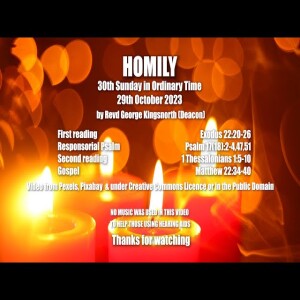
Saturday Oct 28, 2023
Homily 30th Sunday in Ordinary Time 29th October 2023
Saturday Oct 28, 2023
Saturday Oct 28, 2023
Homily30th Sunday in Ordinary Time29th October 2023This week had been busy. Monday had been frustrating because none of my counselling clients turned up, but I did get to meet up with a friend and have a good chat.Tuesday, I had editing to do on a project but there was a lot of preparation necessary beforehand, ensuring sound and pictures were synchronised. It was a boring job, but it had to be done if I wanted to successfully edit the film I was working on. Wednesday, a planned trip was cancelled at the last minute, so I was able to use the time sorting out sound and pictures. Thursday, I also had a work experience student do a Zoom call so I could take her through the filmmaking and editing process. Nine scenes were edited together.Friday, I planned to work on my video homily, but lots of other things happened. I had a good conversation about Christianity and learnt a lot from this encounter. By Friday teatime I had abandoned the thought of writing a homily as my wife and I were going to another friend’s 60th birthday party.We were not sure how the party would go. Both of us were tired. Yet on arriving, we were greeted with such warmth and friendship; any signs of fatigue were instantly expelled. Within a few hours, we had rekindled memories spanning back some 40 or more years. We laughed at how our friend’s children, now adults with teenagers, remembered us from several decades ago. Everyone was smiling and laughing. It was infectious. Little miracles were also shared. One parent adopted a boy who had been split from their sibling. On visiting their adult daughter, the mother got chatting to the next-door neighbour. A young girl came running out, excited to greet the boy. It was her brother. As with many families, all those at the party had their ups and downs, but the bonds between them were strong and they weathered the dark times, coming through the storms into calmer waters.When I arrived in Northern Ireland, nearly 40 years ago, I was the stranger, in biblical terms an alien, but both my wife’s and friend’s families welcomed me. Making me part of their families and accepting me for who I was as a person. They were not prejudiced against me because of a stereotypical outline of a nationality I could have been perceived as. They also help me to see things from a different perspective, alleviating my fears and putting me at peace.Strong relationships were formed, sowing the seeds that would grow into amazing friendships. The two friends I met this week, both lived close to where my family had our home in Belfast. One journey was forged many years ago, another more recently, but both had their origins set many years ago. Someone had caused these paths to connect to allow the bonds of friendship to develop. Those connections were not accidents, not coincidences that randomly happened. We are not in control of our lives, no matter how much our world tries to convince us we are. If we can accept God’s trust. To love him as he loves us, he will give us the strength we need to conquer the adversities that assail us. The doubts we have about ourselves, can at times attempt to crush us. One of my conversations this week was about where our riches are. The conclusion was not in money that decays. No, our wealth is in the love we have for our families and our friends. If we can build good relationships with those around us, relationships that last a lifetime, we will be laying down a foundation based on love, which will bring us the rewards we need to get through life. Filmmaking does not generate lots of money, even though there is a perception that it can. However, when a group of people come together to create a piece of art, if there is respect for one another then strong relationships can be built, so the process can be repeated, again and again. When my wife and I had renovations done to our home; we saw the same relationships had been forged with those who came into our home to do the building work. The same coordination and planning had gone into the project. It is all about setting a firm foundation that will last.In counselling, we talk about automatic negative thoughts. In Christianity, this could be seen as the devil trying to trip us up. If we look beyond ourselves and love our neighbour, without judging them, what shackles are placed upon them can be shattered by the love of God that you share with them. We can, simply by loving others, become the model St Paul talks about that others will want to share in. We all must watch the thoughts we get in our minds. Through prayers and worship in God the Father, Son and Holy Spirit, our focus can be less self-centred and more outward-looking to help others. So let us love God, love others and we will be loved.Amen.
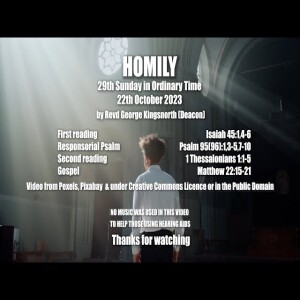
Saturday Oct 21, 2023
Homily 29th Sunday in Ordinary Time - 22nd October 2023
Saturday Oct 21, 2023
Saturday Oct 21, 2023
what the Pharisees stood for. There was only One God, the Lord God Almighty whose chosen people were the Israelites. A promise to Abraham, whose name means father of nations. The Pharisees sent their followers to trap Jesus. He was with his disciples who saw the tension between him and the religious authorities. He was constantly challenging them. Initially, the Pharisees’ men praised Jesus for his honesty in his behaviour and “teaching the way of God”. They recognised Jesus feared no one, especially those higher up in the hierarchy, including the Pharisees. Their question was simple, they wanted to know his opinion on whether to pay taxes to Caesar or not?If Jesus had said, yes, it was right to pay Caesar, then he would be saying the self-imposed man-god should be honoured, something totally unacceptable to the Jews who followed the first of the ten commandments: “You shall have no other god before me”, and the second commandment “You shall not make yourself a carved image or any likeness of anything in heaven above or on earth beneath or in the waters under the earth”.If Jesus had replied, no, don’t pay taxes to Caesar, then he could have been accused of inciting disobedience and rebellion against the Romans, which would require the death penalty. The Romans would be doing the Pharisee’s dirty work.Instead, Jesus was aware of their tricks and asked those questioning him to show him the money used to pay taxes. One of the Pharisee’s men pulled from his pocket a coin, instantly demonstrating his hypocrisy. He was happy to use the coin with the engraved image of Caesar, inscribed with words suggesting the emperor was divine. He had this idol in his pocket that broke the first and second commandments. Jesus asked the group; “whose head was on the coin?” They replied “Caesar”. Jesus responded by saying; “give back to Caesar what belongs to Caesar and to God what belongs to God”.As Christians, we are called to be lawful citizens, accepting the civil laws of our land. We are to be good and responsible, helping to pursue the common good for our society. Within our communities, what we give back to others we are giving back to God what belongs to him. Until recently, State Laws have followed God’s Law, but in recent decades there has become a division within what Secular Laws have imposed on us, differing from the Law of God. Many believe this is because we have become more progressive and that we humans know better. Yet, in our world, we can see much confusion and distrust in the systems set up to control our lives. Most laws are there to better corporate needs to make a profit. The wealthy can persuade government leaders to favour their views and not the views of the people. It is becoming harder for Christians to follow state-guided morality. We see in our news how wars around the world are becoming everyday talk. Not long ago, it was the war in Ukraine brought on by Russia’s invasion. Now we are seeing the Middle East flare up, with similar consequences. In Russia, a small number of powerful people are neglecting the will of the population, taking away their voice of protest, and enforcing harsh prison sentences for those who do not conform. Striking fear in their population. Echoing a time some eighty years ago, when a similar regime drove fear into its own population, and those in many European countries, forcing millions of Jews, Christian clergy, political opposition leaders, and many considered by that government to be subhuman to their deaths. As Christians, Paul calls us to work for love and to persevere through hope in our Lord Jesus Christ. Isaiah reminds us that all is nothing without God. Even though the devil would like us to believe that God is not with us, this is a simple lie. Through our prayers, through our readings of the Bible, both the Old and New Testament, we can see the truth that God the Father, Son and Holy Spirit is with us always. All we have to do is recognise the fact and accept him into our lives. To follow him.This Sunday is Mission Sunday. We are all called to share our faith with others. To actually speak out loud and profess our faith in the Lord Our God. The spoken word has great power. As it was for Joshua when his army surrounded Jericho, the power of their voices brought down walls. The power of our voice when shared with others in speaking about God, can bring down the walls that imprison those who are searching to find God in their lives. There are many out there in the world who wish to trick us into being silent. Our mission is to equip ourselves with God’s armour and challenge the world. For without God, there is nothing. Our faith is everything.Amen.
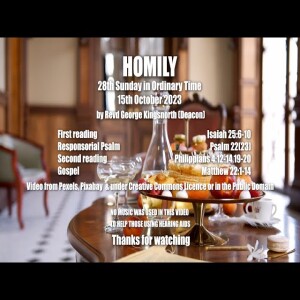
Friday Oct 13, 2023
Homily - 28th Sunday in Ordinary Time - Sunday 15 October 2023
Friday Oct 13, 2023
Friday Oct 13, 2023
Homily28th Sunday in Ordinary TimeSunday 15 October 2023Last week, a small crew gathered to make a short film. The amount of effort that went in to ensure there was enough food during the breaks, lunchtimes and evening meals was immense. Everything had to be perfect, to the point where none of the crew would have noticed, other than they got to enjoy the meals and drink. All the behind-the-scenes had to be managed so everyone could be in the right place at the right time, even when the schedule changed due to unexpected weather, or a cast member having to arrive or leave at a different time. The amount of preparation for a simple four-day shoot, took several months prior to principal photography. There were also a few sleepless nights, as the first day of filming drew near. Little upsets, that could have turn the whole project on its head. No matter how much effort you put in, there comes a point when you must hand it all over to God, to put your trust in him that everything will fall into place.With all the preparation, some may say too much, you do have everything covered, simply because you have used all the tools available to you to counteract any contingency that may arise. Our film had extensive wardrobe changes, and we shot the film out of order, so we had to ensure continuity was maintained. Now, think of what could have happened if no one turned up? What a disaster that would have been. All the food would have gone to waste, hiring of camera, lights, sound equipment and all the accessories still had to be paid for. All the preparation would have been for nothing. How frustrating would that have been? On the part of everyone, there is a massive commitment needed to ensure all the parts mesh together and function. Only then can the end results be produced. In the case of a film, everything must be shot in a way that the editor, who is not necessarily on set, can locate and turn into a finished film. Four days filming usually ends up being sixteen days of editing. Imagine the banquet the Lord of Hosts has prepared, as Isaiah tells us to, for every human being on the planet. All the rich foods and fine wines. God will wipe away Death, along with the tears of those who are in pain or bereaved. Our shame will be taken away. God will bring about our salvation, and we will be lifted and be joyful.Paul reminds us that he experienced good times and bad. With God’s help, he knew he could cope with anything. Through Christ Jesus, all his needs were provided, and so will ours if we put our trust in him.Jesus tells us in Matthew, the kingdom of heaven is like a king putting on a feast for his son’s wedding. Everyone is welcome, the only rule is that we come appropriately dressed, to honor the father and the groom. What the king faced were guests who ignored the invitation. Who beat up the messengers, killing some of them, to carry on in their selfish ways. In the king’s fury, he sent troops to kill the murderers and destroy their towns. This opened the way for others who were more willing to accept the king’s invitation and commit to attend. Even then, one guest did not dress properly and had no excuse for his carelessness. That person was bound hand and foot, then thrown into the darkness, into a harsh place of crying and stress.On a film production, many are invited to be part, both cast and crew. If the wrong actor is chosen, the film could be a disaster. Likewise, if the crew have the wrong attitude, they can bring down the production. I remember one production where the wardrobe designer told everyone that the film wasn’t a proper film. Such comments unsettled the rest of the crew, making them think the production they were on, could affect their credibility for getting work on future productions. There is a saying, “You are only as good as your last project”. Due to the disharmony that was spreading, the wardrobe designer had to be replaced to help boost morale.On our film set, virtually everyone had their own worries, stuff that at times would have had them in tears or suffering from great anxieties. Yet, for a few days, they each had time to be in the present, to be in the now, putting behind them their concerns of the past and their worries for the future. They became focused on the task at hand. Then, during the breaks and lunch periods you could find them laughing and joking about the experiences they had just shared together. They were no longer lonely, lost in their own world of problems, but were getting a chance to share with others a common goal. All knew they were not in control; they had reached a point where no matter how much preparation made, it was all in God’s hands. All that was needed was to have faith. They were the chosen few. Many had been invited but this group had come to the call. They had accepted the terms laid out and were happy to be led. All God asks of us is that we can accept him, and he will direct us to a rich banquet in the kingdom of heaven.
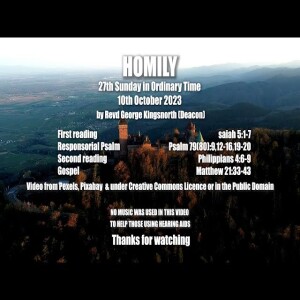
Tuesday Oct 03, 2023
Homily - 27th Sunday in Ordinary Time - 10th October 2023
Tuesday Oct 03, 2023
Tuesday Oct 03, 2023
Homily27th Sunday in Ordinary Time10th October 2023The first reading and the gospel for the 27th Sunday in Ordinary Time, talk about a vineyard. Both owners spend time preparing the ground, fencing it off, sowing seed, digging a winepress, and building a tower. Both had expectations of yielding rich produce. Isaiah tells us his friend's vineyard produced sour grapes. In our world, we would associate “sour grapes” with someone complaining about everything and constantly grumbling about the situation they find themselves in. In the end, that person appears to others as being unpleasant, never satisfied, and they leave a bitter taste. Another way of describing them is they are being sharp with everyone because of their distastefulness. Those who were “sour grapes” in Isaiah’s story, he revealed were the House of Israel and the Men of Judah, because they had rebelled against God and were complaining that God had abandoned them. God had provided everything in the vineyard that should have produce sweet grapes. In Matthew’s Gospel, Jesus’s parable echoes Isaiah’s story, about a vineyard being set up in the same way. This time the owner let’s the vineyard out to tenants, expecting them to nurture the land so the vines grow to produce a fruitful harvest. Yet, each time the landowner sent his stewards to bring back the produce, they were beaten, killed, or stoned. The second group was treated no better, so the owner sent his son, believing he would be respected but instead, the tenants schemed to kill him and take his inheritance.Isaiah tells us that the wall will be destroyed so wild animals can graze on it, the vine will not be pruned, and the place will be left to wreck and ruin, overcome by briars and thorns. In Matthew, Jesus warns us that the Kingdom of God can be taken away and given to people who will produce a rich harvest.If we look at the world around us, we are told that we must make sacrifices so global warming can be prevented. We humans must act to prevent the world from being destroyed. Our scientists will be able to solve the problem if we listen to them. But is this not mankind’s pride in the false belief that we can solve the problem in the first place. Why will people listen to scientists when they won’t listen to God. Left to our own devices, we have seen so many problems have not been solved. The planet is gradually heating up. The weather system is producing far more storms, and everywhere on the globe we are seeing the devastation of fires and floods. In winter, temperatures are reaching lower levels than have been recorded before, and during summers the heat causes fires that seem to be constantly alight. In 2019 in August alone there were 79,000 fires detected, compared to 16,000 in 2018. Half were in Asia, more than a quarter were found in South America, and 16% in Africa. Together, 93% of the fires were detected globally that year, leaving just 7% split between North America, Europe, Australia, and surrounding islands in the Pacific Ocean.Back in 1950, there were around 2 million tonnes of plastic pollution. By 2015, this had increased to 448 million tonnes. This is expected to rise to around 1.3 billion tonnes in 2040. No matter what we do, problems seem to get worse. What’s going wrong?Paul told the Philippians they needed to pray, ask God for help, and give thanks to him. If we can do this also, we will receive God’s peace, which in turn will guard our hearts and minds, through Jesus Christ. We are encouraged to fill our minds with everything true and noble, with everything good and pure, with love and honor. All those things that are considered virtuous and worthy of praise. Can we? Are we still able to? In a world full of social media influencers, who seem to know better, giving their advice. What is needed is critical thinking, the ability to look at the pros and cons from an objective perspective. This may mean distancing ourselves from our favorite idols, the gurus who draw our attention away from God. The fearmongers who deliberately attempt to confuse us and play on our emotions to get us angry and offended, simply because of the language they use to trigger a response from us.In another garden, two people were tempted to eat the fruit God had warned them not to. They were influenced by the King of Lies, duped into feasting on the fruit from the Tree of Knowledge. All this did was get the two of them arguing against each other, in the blame game we see going on so much. Again, to confuse us into not knowing what to believe. Instead of turning away from God, we need to focus on him, and not get distracted by all the lies being spread around us. We need to trust in him. When we do, Jesus says, he will call us his friends and he will teach us everything he knows, learnt from his Father. If we believe, repent, and turn back to our loving Father, peace will be with us. We are the ones chosen to go out into the world and bear fruit that is eternal.
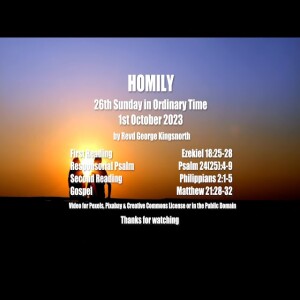
Saturday Sep 30, 2023
Homily - Sunday 1 October 2023 - 26th Sunday in Ordinary Time
Saturday Sep 30, 2023
Saturday Sep 30, 2023
HomilySunday 1 October 202326th Sunday in Ordinary TimeOver the last week or so, there have been plenty of times when the ability to choose has cropped up in our lives. All of us are constantly having to make choices. So much so, that we probably don’t really think about it too deeply. Some can be trivial: Do I get up when the alarm rings or take a few more minutes to lie in bed? Do I have coffee or tea this morning? Brown shoes or black? Most of these probably won’t have a major impact but they are still choices. Perhaps you disagree? Declan was a big football fan, and his team was playing in a big final. He had the tickets to go to the match with a couple of mates. Bronagh, his wife, was on holiday in Malta with some of her friends and would not be back until two days after the game. All looked good. The day of the match came, and Declan prepared to go with his friends. However, just as he was going out the door, he got a phone call to say Bronagh had taken ill and was being flown home that night, at the same time as the kick-off. What does Declan do? Thankfully, Declan is still married as he chose to pick Bronagh up from the airport as he knew where his priorities were.However, in an alternate universe, far, far away, another Declan chose to go to the football match. Bronagh kicked him out of the house for abandoning her and for the first time in his life, Declan found himself homeless. This affected his work, so he ended up getting fired and he wished he had made a better decision. He forgot the golden rule, “Happy wife happy life”.Often, we find ways to complain about the things that go wrong in our lives. We tend to forget that we have been the ones who have made decisions and taken certain paths and have not realised the consequences of those actions. In Matthew’s Gospel this Sunday, the first son is reluctant to do what his father requested, initially refusing to do as he was asked. On thinking about this, he changed his mind. Instead of thinking about himself, he realised his father needed help. In his actions, he proved to be a helpful and loving son. The second son promised he would, but did not carry through. His actions showed he lacked respect for his father. We can easily see the first son was the better son.Paul reminds us that we need to put others first before ourselves. It is our actions that prove our love for others, not our words. As sons and daughters of God, we too make promises that we often do not keep, for one reason or another. It is at these times that others suffer because we have not followed through. We have lost our integrity, as Ezekiel describes in the first reading, and fall into sin. In a way, we have died a little, but Ezekiel reminds us that we can choose to change our ways and renounce the wrong we have done. Likewise, to those whom we have promised we can apologize, and make up for the wrong we have done by putting them first above our own self-interests. In doing so, our spirit is lifted, and we come back to life. Jesus reminds us that we should not be competing with others but working with them so that all benefit. Putting others first is more important. In the alternative universe, Declan had put his love of a game before the love of Bronagh. On his own, he could not affect the outcome of what would happen on the pitch, but by putting his wife’s needs first he would have been demonstrating his love for her through his actions. Today, we are being asked do we show our love for God through our actions, or do we put our own self-interests first, and then complain to God when things go wrong. We have been given a free will to choose. If we can make the right choices and put others first, we will be showing our love for God. If we can be like Jesus, we will be richly rewarded and live. If we put ourselves first, we will gradually die inside, and our hearts will become as hard as rock. The Good News is that we have every opportunity to change our minds and turn back to God. We show our love through what we do for others.Amen.
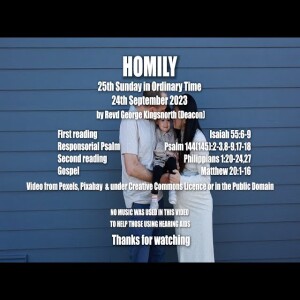
Sunday Sep 24, 2023
Homily - 25th Sunday of Ordinary Time - 24th September 2023
Sunday Sep 24, 2023
Sunday Sep 24, 2023
Homily25th Sunday of Ordinary Time24th September 2023There is a lot to unpack in this week’s reading and gospel. Yet, we are reminded that the way we think is not the way God thinks. There is such a distance between us. Why? In my daily Bible readings, I am constantly reminded of how the Israelites persistently went in the opposite direction to God. He gave them the Ten Commandments. But no sooner had Moses gone to be in God’s presence, and the Israelites lost their faith, fashioned a Golden Calf out of metal and began to prayer to it. Often, we hear such manmade idles cannot be made to breathe. They cannot see or hear. They cannot move. They are static. They have no agency. And so, the people who make them have no understanding. We live in a world that so often cannot see, hear, or sense God’s presence in their lives. They have become clogged up with material things.If we follow what is said in the first reading from Isaiah, there is still time to seek the Lord, to call on him for help in our lives. God wants the wicked to turn back both from their actions and their thoughts. God will have pity; he will have mercy and he is rich in forgiving. We like to think we know best but Isaiah tells us that we do not think like God does. The Bible portrays this in virtually every story that is told within its pages. If we can turn back to God, when our hearts and minds are distracted by worldly problems, then we will be able to find him. We will be able to recognise that he has been standing beside us. It is just that we have been ignoring him.The psalm tells us how compassionate God is. He is slow to anger, even though we probably deserve a good chewing. But then, there I go. Not thinking like God thinks but thinking as a human. The Lord is abounding in love, and compassionate to all his creatures. He is just in everything he does, even when we cannot fathom out what is happening. He has his reasons.We can see Paul struggling with this when he writes to the Philippians. He wants to be with Christ so much he is happy to forfeit his life. Christ will be glorified in Paul’s body whether he is living or dead. What is important is God’s will, not Paul’s will, and not our will. If we love God the Father, Son and Holy Spirit, every moment of our lives we will want to do his will, knowing that if we do there will be good results, because we will be doing God’s will and through his love, only good is done. This is why Paul reminds us to avoid doing anything that is unworthy of Christ’s Gospel, Christ’s Good News.The story Jesus tells in the Gospel seems very confusing to many of us because in this world we think about our value based on money. If I do so many hours, I should get so much pay. If I do eight hours of work, I should get eight times more than someone who simply does one hour. That’s how maths works. But Isaiah has already told us we don’t think like God does. The rich man’s generosity is his to give. I wonder if you have ever thought of this when your children come along. There seems to be certain values we parents like to instil in our children. But do we get confused with thinking like the workers that we should get more pay for more work we put in.I remember when our first son was born. My wife and I were overwhelmed with love for him. Without thinking of the cost, we made sure he was fed, his nappies were changed, he was clothed and kept warm. Even when there were sleepless nights, after sleepless nights we would each in turn get up to sort out the issue. What also, astounded us was from the moment he was born we felt as though he had been with us for eternity. Then, we were delighted when we discovered my wife was pregnant a second time. We still had to look after the first child. But we wondered how on earth were we going to be able to give this second child the love he needed when we loved our first one so much. We would give our lives for him, and still would even now when he is a man with his own children. Yet, when we saw our second child take his first breath, we suddenly realised we could love them equally as much without diminishing our love for our first child. Again, we felt both boys had been with us for eternity. When we can love those around us with such generosity, the cost, and the expense has no meaning. We are rich in the blessings we have been given in the love we have for our children, and we recognise the love they share with us, now they are adults. There is nothing more precious than the love of our children. How much more does God love us as his children, and what would he not do to ensure we had the best that could be offered. God the Father was even prepared to sacrifice his first-born son, Jesus, in order that we all, every human being that has ever lived and will live, could be saved from the destruction that sin brings into the world. God loves us. It doesn’t matter if we came first or last, his generosity is unlimited and given equally to us all.
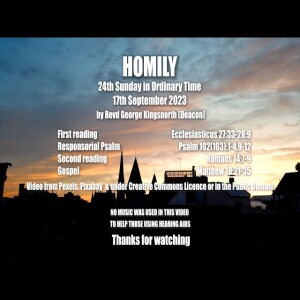
Sunday Sep 17, 2023
Homily - 24th Sunday in Ordinary Time - 17th September 2023
Sunday Sep 17, 2023
Sunday Sep 17, 2023
Homily24th Sunday in Ordinary Time17th September 2023About thirty or so years ago, I was living in Belfast. Our eldest was about 3 at the time and we were still very much in the Troubles. Between various Christian groups, there were meetings and prayers to help bridge gaps. We were attempting to get to know and understand our neighbours across the divide. Coming from an Anglican tradition, with cousins in the Catholic Church and others connected to the Baptist Church, I had had experience in England with how each had respected the other. At least, I thought I had, until I decided to join the Catholic Church, then another can of worms opened and I began to see prejudices coming out that I had never seen before.But back to the meetings in Belfast. There was an elderly English Catholic lady, we will call Cindy (not her real name) who lived in the middle of a Loyalist area. She invited me to bring my son down to a meeting to say some prayers and chat with some of her Protestant friends. At the time, I didn’t have a car, so Cindy picked me and my son up and brought us to her home. The afternoon tea went down well as did the chat and prayers. However, at the end of the meeting, Cindy led us to her door and said cheerio. I had to walk home, out from a Loyalist area into the Catholic area where I lived. At the time, there was a lot of shootings, and the news was full of deaths and funerals on both sides. So, things were tense. I knew if I went straight home it would be obvious I was a Catholic in a Loyalist area. I was concerned for my son’s safety. I put my son on my shoulders and headed in a different direction. There were definitely eyes watching us, and I knew at one point I was being followed to see where I was going. Thankfully, we did get home, but I felt extremely hurt that I had been put in this situation and Cindy seemed to have no concern for me or my son’s safety. For quite some time, I struggled to talk to Cindy, because of the hurt I felt. Then Cindy moved into the estate we lived in. In fact, to the house opposite our front door. I still found it hard to forgive her. As time went by, I began to realise how this hurt I felt was doing more harm to me and having no affect on Cindy. She settled into her new neighbourhood and continued to connect with people. I came to a point where I knew I had to find the courage to ask Cindy for her forgiveness, for the way I had started to treat her, ignoring her, as I had found it hard even to talk to her. The day came when I found the strength to face her and apologise. And she had the grace to forgive me, as I had found it in my heart to forgive her. As we hear from our first reading, resentment and anger are foul things, being found in the sinner. My shunning of Cindy had corrupted me. We are told that if we harbour such anger towards another, how can we demand compassion from God. In the extended reading from St Paul to the Romans, he reminds us of how we should not judge others because they do things differently. He specifically mentioned those who eat meat and those who just eat vegetables. All food is considered good by God, but if the way we have been influenced means we consider meat wrong to eat, and we choose to eat only vegetables in our thanks to God, then that is okay. Whatever we do, if it is to glorify God, that is acceptable, but we must not then judge others, because for them they give glory to God, through eating meat. Where it is wrong, is if we force someone who eats meat to just eat vegetables, and punish them when they do not, or vice versa. What is more appropriate, is that we should not be the cause of our brothers and sisters to trip or fall, because of the way we have judged them. God chooses the path for each one of us. At times it may appear to be different from what others around us seem to be doing. But our focus must be on doing what God wants us to do. And we must allow others to do the same, even when it appears to be different. If they are living for the Lord, they belong to him also. In the Gospel, if the bad servant had been more compassionate, forgiving, and more understanding towards the servant who owed him money, he too would have been forgiven. We need to learn how to forgive others, even if it means seventy-seven times or more. Cindy and I did become friends again. All that had divided us had been mended. I had realised that if I wanted to remain a Christian, I had to learn how to forgive those who caused me pain. Like me, they struggle in this world, trying to make sense of what it is all about. Thankfully, through following Christ and becoming part of his community, I have learnt more about being compassionate and showing love. Our lord encourages us to remember his commandments, and not to bear any ill-will against our neighbours. If we can forgive our neighbours the hurt they have done to us, whether intentional or not; when we pray, God will forgive us our own sins.Amen.


